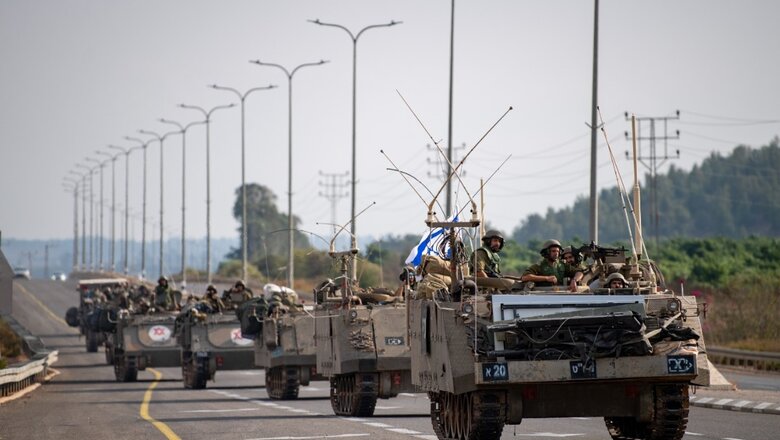
views
As the bloodletting continues by both sides in Israel and Palestine, the mystery of why and how it happened is only deepening. Already several theories are afoot, including that the whole is a ‘false flag’ operation, that it was fathered by Russia or China or both, and oddly, with far fewer people blaming the whole on Iran. That’s surprising. The story is yet to unfold, and its endpoint may be quite different from what one expects.
As a bare-bones facts-only scenario, the whole becomes even more baffling. Reportage shows not just a barrage of several thousand rockets — a form of warfighting seen before but nowhere on this level — followed by the large-scale infiltration through high-security fences on an unprecedented scale. Most fighters crossed through breaches in land security barriers separating Gaza and Israel. At least one was filmed crossing on a powered parachute while a motorboat was filmed heading to an Israeli coastal town and military base. Footage showed bulldozers tearing down fences, and according to the Israel Defence Ministry, rapid incursions into at least three military installations around the frontier. More than a thousand fighters were involved.
Now consider this in terms of a secret operation. Backup for such a coordinated assault would have involved at least a thousand more in terms of provisioning the assault, a dedicated core team of a dozen or more to ensure coherence and a convoy that provided the rockets and the weaponry.
Reports quoting ‘sources’ say the attack team was exercising in plain sight, with a mock-up of an Israeli settlement, and had been in planning for two years. During this period, Hamas built up an image of itself as more interested in economic benefits, (apparently) fooling everyone, including groups like Fatah, who mocked it. That this level of secrecy was kept to the end, and no chatter picked up seems unbelievable in an area that is virtually under 24×7 surveillance.
A real whodunit
’X’, formerly known as Twitter, now has some detailed wondering about how the whole affair is assuming a ‘9/11’ vibe, and whether this is, in fact, another instance of a ‘false flag’ operation made worse by references to this as a ‘Pearl Harbour’ event, which marked a huge shift by bringing the US into the World War. The reasons for these are not just the intelligence surprise, but also (alleged) Israeli covert operations like the Lavon affair, a failed operation conducted in Egypt in 1954.
This involved the recruitment of a group of Egyptian Jews to plant bombs inside Egyptian, American, and British-owned civilian targets: cinemas, libraries and American educational centres. The bombs were timed to detonate several hours after closing time, and were to be blamed on the Muslim Brotherhood, Egyptian Communists, and “unspecified malcontents”. The reverberations of the operation, though it failed, swept across history, and eventually led to the nationalisation of the Suez Canal among other events.
Other such operations include Israelis posing as American agents and recruiting Jundullah terrorists against Iran. These and other skilful operations are part of legend. But that a sitting prime minister would allow more than 700 of his people to die as part of a ‘false flag’ operation is unbelievable. Besides, it is the worst ever timing. Israel is close to signing on to a historic peace aimed at bringing together the most important countries of the Middle East.
And lastly, all agencies have had failures (including our own) sometimes, in the face of overwhelming evidence. Recall Kargil and the spate of reports that preceded it. Recall also that when a courageous Indian Prime Minister, Atal Bihari Vajpayee, visited Pakistan in a gesture of trust, Kargil was already being planned. Sometimes, we like to believe what we want to believe. And Israel has seen a surge of those calling for peace and against so-called ‘right-wingers’. That movement is done.
Who helped Hamas
Could Hamas have done this without any assistance whatsoever? Unlikely. The history of terrorist attacks shows that success is usually concomitant with a degree of state support. Iran has absolutely denied its involvement. But then it would. Accusations that it was Iran at the bottom of this are already rife on social media, including major news outlets. The Israeli representative in the US says he’s sure of Iranian support to Hamas and ‘by extension’, the present attack. The Israeli military has rather sensibly, yet to confirm its involvement. However, US Secretary of State, Antony Blinken observed that there was no evidence that Tehran had done so, nor that it had been able to use $6 billion in (own) funds released by the US in a prisoner swap. That swap marked a major diplomatic breakthrough but was accompanied by more sanctions to underline that this did not mark any great shift. Iran expectedly praised Hamas for its attack, and its motivations were made clear by public imprecations of Iran’s supreme leader, Ayatollah Ali Khamenei, in a clear warning to Riyadh that any Gulf state that backed the US was backing the wrong horse.
It seems that a Middle East peace which leads to Israel being accepted by all is not in Iran’s interest. Many point to the public support of the Shia Hezbollah as evidence, but the group has so far not chosen to activate the northern borders. It is also worth noting that Hamas’ actions led to celebrations by right-wingers and anti-Semitic groups all over the world, not to mention countries like Pakistan who chose to restate their official positions (borders of 1967 which is completely off the table) while its foreign minister chose to go one step further in calling for withdrawal by “occupation forces”. In contrast, the UAE expressed “a serious and grave violation” while Saudi Arabia called for “immediate cessation’ of attacks.
All however underlined the need for the international community to provide a ‘lasting solution’, as did Turkey which has hosted Hamas in the past and called for mediation. Russia’s Sergei Lavrov questioned Western policy on Israel, and noted, “We cannot agree with those who say that security can only be ensured through a fight with terrorism.” Russia intends to work with the Arab League to end the conflict, which, when translated, means that Russia wants to retain its influence in this strategic region. China just called for an immediate ceasefire while backing a Palestinian homeland. Beijing is never one to overstate its case.
Who benefits?
The mainstream media reaction is that this marks the end of the US-brokered Middle East peace, which hinges on a Saudi-Israel deal. That seemed to be making some progress as the first-ever Israeli delegation – even if only there for a UNICEF meeting – in Riyadh last month. Clearly, progress in this final leg of a Middle East peace would have hugely increased the US’ role in this region and strengthened Saudi Arabia’s search for economic alternatives away from just fossil fuels. None of that would have benefitted Iran. But Iran chose to make peace with Saudi Arabia under the auspices of China, and in June opened its embassy in Riyadh after a gap of 7 years. That is progress too.
Apparently, Iran also sees its future with the Saudis in peace. That’s an anomaly that the present rush to blame Iran doesn’t account for, though it could also mean that Tehran doesn’t want the Saudis to bring Israel – and thereby the US – into a stable Middle East, where the ‘peace’ is brokered by China. Russia certainly is on the same page. Iran has certainly backed Hamas and other protégés. The question is whether it would sanction such a scale of an operation, and to what immediate benefit, when it torpedoes its own peace initiative.
Meanwhile, the conflict has already spread. Furious pro-Palestine protests erupted in New York, while a Jewish restaurant was vandalised in the UK. For Delhi, the immediate reaction should be to significantly increase security for Israeli institutions and businesses here, and keep an even closer eye on Hamas copycats in the region. This is not going to end soon. Indeed, Tel Aviv has only just begun.
The writer is a Distinguished Fellow at the Institute of Peace and Conflict Studies, New Delhi. She tweets @kartha_tara. Views expressed in the above piece are personal and solely that of the author. They do not necessarily reflect News18’s views.




















Comments
0 comment